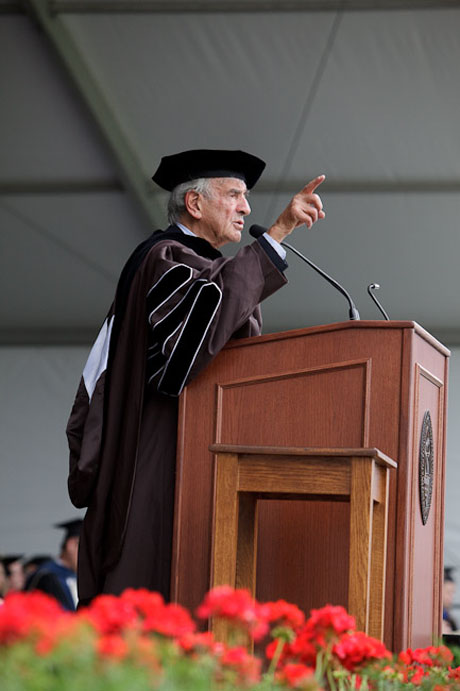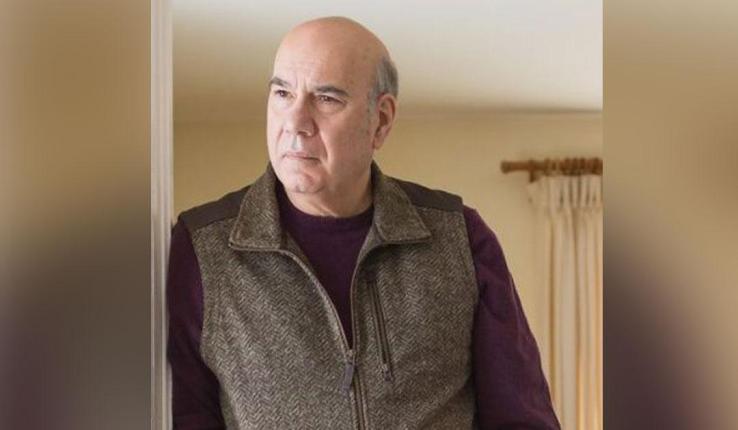Elie Wiesel exhorts the Class of 2010 not to succumb to indifference
Humanitarian, author and Nazi death camp survivor Elie Wiesel offered graduates from the Class of 2010 a sobering message as they begin their lives after college, warning them not to become indifferent to the suffering of others, lose their passion for learning, or allow the lessons of the brutal 20th century to be forgotten by future generations.
“Life is not made of years, but of moments,” the Nobel Peace Prize winner told the audience of nearly 1,450 graduating students and their families, who gathered in Goodman Stadium on May 24 under threatening skies. “This is a watershed moment. And what you have learned here will have an impact on all the events of our future.”
He asked the audience to think back to Dec. 31, 1999, when he said many were no doubt celebrating the end of the 20th century and the beginning of a more promising future. “It was the end,” he said, “of what was one of the cruelest centuries on record.”
Still, he said, the 20th century saw the end of colonialism, the defeat of the Nazis and the end of racism.
“Racism vanished. Racists still exist, but racism, as a movement, is gone,” said Wiesel, although he noted that it was not without sacrifice: It took the murders of President John Kennedy, Senator Robert Kennedy and civil rights leader Rev. Martin Luther King to institutionalize racial equality. “They paid a great price. But racism is no longer law.”
Urging students to hold on to their passion
When Wiesel came to America in 1956, he said he toured the South with his friends, and was appalled by the existence of laws that “humiliated an entire community, simply for the color of their skin.
“I felt shame for the first time,” he said. “I never felt shame for being Jewish, but I felt shame for being white.”
The 21st century has brought more suffering—two wars, the continuation of strife in the Middle East, the threat of war between North and South Korea, genocide, poverty and more violence. Graduates also face a world where children are dying—from hatred, war, poverty or indifference—every minute of every day.
“These past four years, you have been protected, almost shielded,” he said. “I am no prophet—nor do I want to be. But the texts of the prophets are filled with passion. I try to teach my students, after 40 years in the classroom, that passion and fervor must remain. You cannot allow yourself to become indifferent.”
Wiesel said he embraces the now-familiar phrase: The opposite of hate is not love. The opposite of hate is indifference.
“The opposite of humanity is indifference to humanity’s destiny,” he said. “So whatever you do in your life, indifference is never an option.”
Wiesel closed with a parable of a man lost in the forest, who began to despair as the days passed. Finally, he sees another man, and runs to him with joy and relief. “Thank God you’re here,” the first man says. “How do we get out of here?”
The other man replies, “I don’t know. I am lost as well. But do not go this way because I just came from there.”
Wiesel concluded: “There are certain paths we cannot take. I know, because I came from there.”
Gast cites a special bond with this year’s graduates
Following a standing ovation for Wiesel, Lehigh President Alice P. Gast thanked him for his compelling commentary and congratulated the members of the Class of 2010.
“I must admit that I have a special bond, a feeling of kinship with all of you,” she said. “We started our time at Lehigh together in the summer of 2006, and thus we have a shared history over the past four years. Together, we got to know this wonderful university and together, we have made many friends, established many memories, and learned a great deal.”
The past four years at Lehigh took place against a backdrop of tumultuous world events that included earthquakes in China and Haiti, genocide in parts of the world, the financial meltdown of 2008, and the election of a new U.S. president.
Lehigh students responded to world events through volunteerism, debate and engagement, Gast said.
“I hope that, through your experiences at Lehigh, in these important times, you have developed the wisdom, resilience, creativity and dexterity to become the leaders the world needs in this century,” she said.
“Having the vision to change the world doesn’t just happen. It is not mystical. You don’t wake up one morning with a new image or a fully formed idea. It involves open eyes, an open heart and an open mind. It involves seeing things the way they are, and thinking about the way they should be. It involves learning from your experiences and from the experiences of others. And it involves learning from people right here at Lehigh who inspire and motivate us to question the status quo.”
Gast cited the examples of Allison Prosswimmer ’10, who combined community service with the study of history and participation in the Martindale Scholars program, and Joachim Grenestedt, professor of mechanical engineering and mechanics, who drew on his expertise in lightweight materials to design a better monoski for paraplegics when one of his students, Brian Kaplun ’06, lost the use of his legs after a mountain bike accident.
“Allison and Joachim are but two examples among the many Lehigh people questioning the status quo and making the world a better place,” said Gast.
“You will question the status quo, and you will help change the world,” she told the new graduates. “I wish you a life of happiness and fulfillment—a life where you both give and receive.”
Fast facts
The three-hour ceremony took place on a muggy, overcast late May morning….a total of 1,435 degrees were conferred at Goodman Stadium: 1,058 Bachelor’s degrees, 337 Master’s degrees, 35 doctoral degrees, and five education specialist (Ed.S.) degrees….the Class of 2010 included students from more than 30 countries plus the United States….the ceremony began with a blessing from University Chaplain Lloyd Steffen, which was followed by an a cappella version of the national anthem sung by Lehigh’s “On Tap” vocalists Chase Philpotts ’09, John Rodgers ’08, Jacob Schwartz ’11, and Jeffrey Zubernis ‘09…later in the ceremony, the group also sang the Lehigh alma mater….Daniel E. Smith, chair of the Board of Trustees, welcomed the assembled audience….Charlayne Hayling, a doctoral candidate, delivered the Graduate Student Remarks, and Jack Meehan, president of the Class of 2010, delivered the Senior Class Remarks….Commencement speaker Elie Wiesel received an honorary Doctor of Letters degree following his talk….other honorary degree recipients were Pulitzer Prize-winning writer John McPhee, who received a Doctor of Letters, and Daniel Callahan, president emeritus and co-founder of the Hastings Center, who received a Doctor of Humane Letters….Sarat Sethi ’92, outgoing president of the Lehigh University Alumni Association, officially closed the ceremony with a welcome to new alumni, which was followed by the ringing of the bell by representatives from the classes of 1960 and 2010….the benediction was offered by Rabbi Seth Goren, associate chaplain and director of Jewish Student Life…. the Allentown Band, under the direction of conductor Ronald H. Demkee, delivered their 29th consecutive performance at Lehigh’s commencement ceremony. It is America's oldest civilian concert band, with its first documented performance on July 4, 1828.
Photos by Theo Anderson
Posted on:






